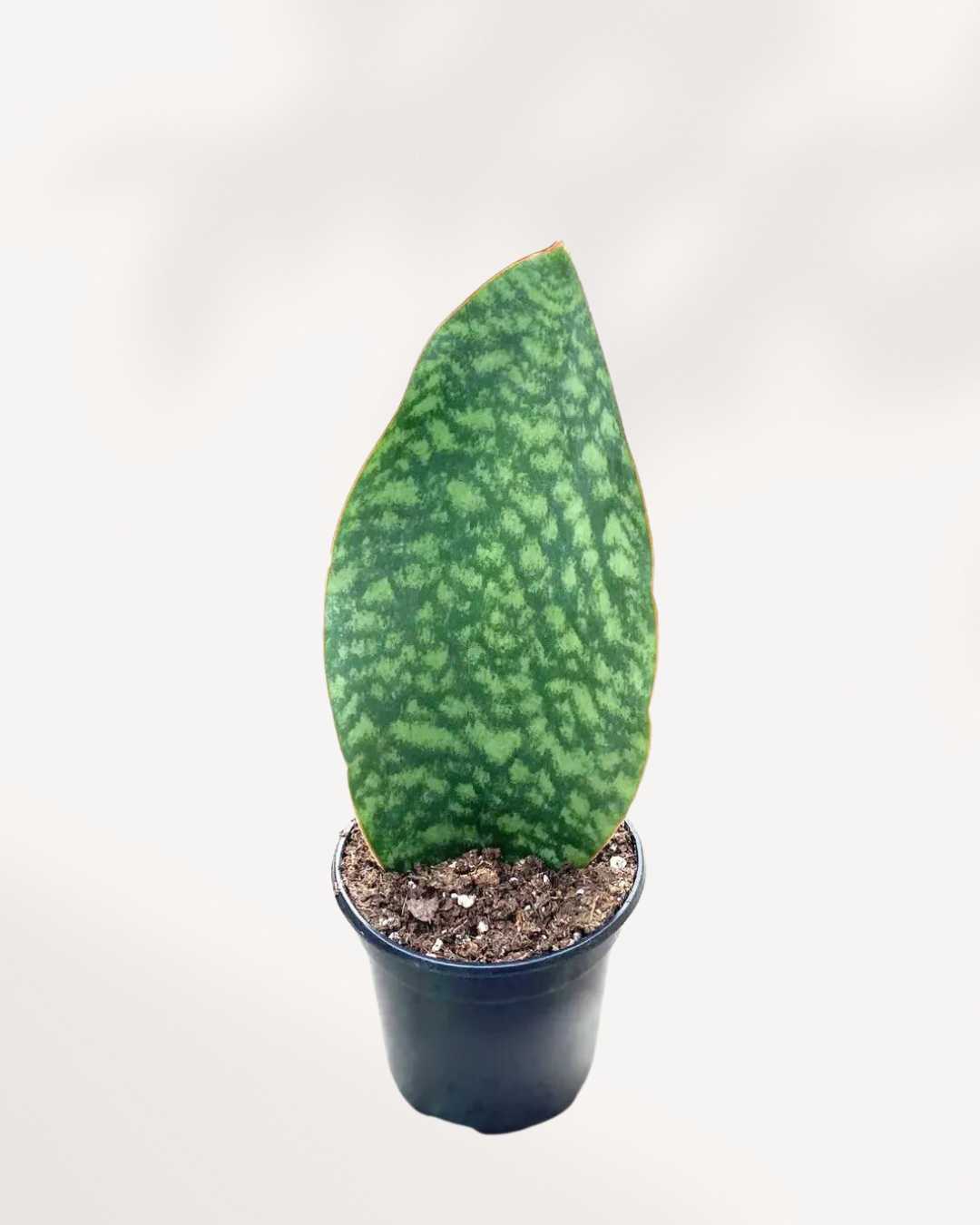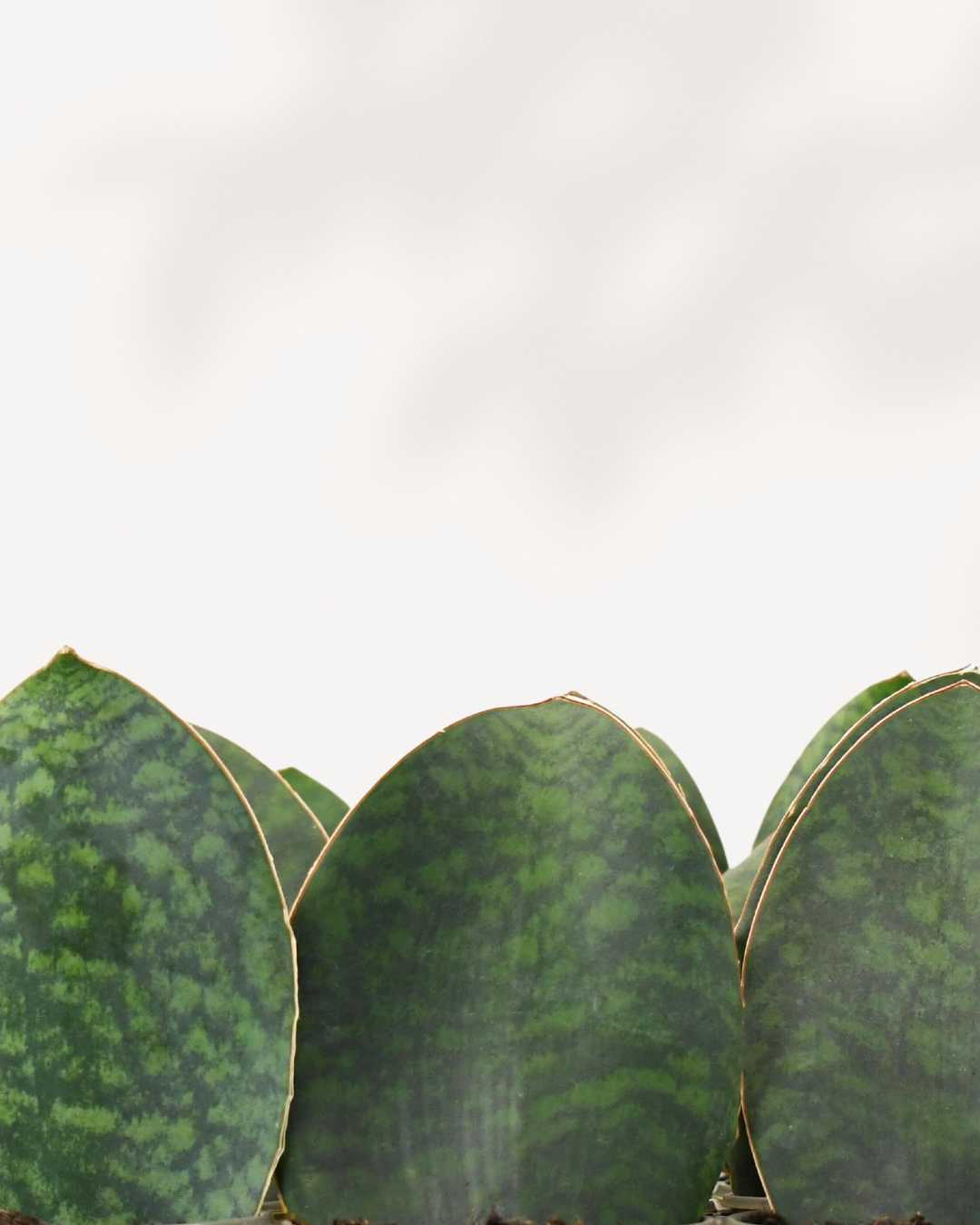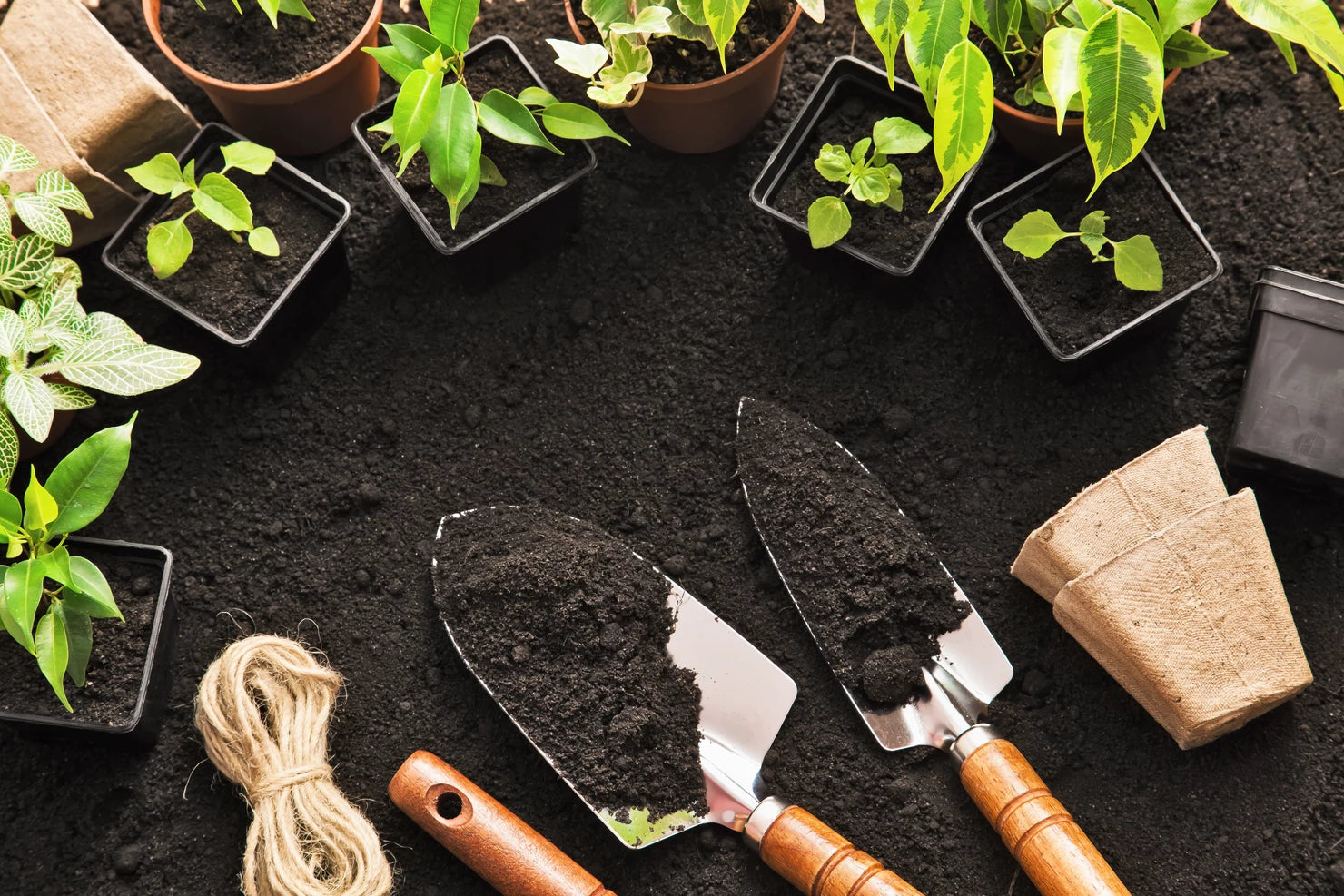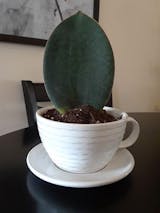Couldn't load pickup availability
Sansevieria Shark Fin, also known as Whale Fin Snake Plant, is a striking and resilient houseplant recognized for its broad, paddle-shaped leaves that resemble a shark’s fin. This unique plant not only adds a bold statement to your decor but is also incredibly low-maintenance, making it ideal for both beginners and experienced plant enthusiasts. Its air-purifying properties further enhance its value as a beautiful and functional addition to any home or office.
Common Names
- Shark Fin Sansevieria
- Whale Fin Snake Plant
- Sansevieria Masoniana
Botanical Classification
- Kingdom: Plantae
- Order: Asparagales
- Family: Asparagaceae
- Genus: Dracaena (formerly Sansevieria)
- Species: Dracaena masoniana
Native Habitat
Sansevieria Shark Fin is native to the tropical regions of West Africa. It thrives in arid and semi-arid conditions, making it highly drought-tolerant. Its natural habitat allows it to adapt well to indoor environments with minimal care, making it a popular choice for low-maintenance plant collections.
Historical and Cultural Significance
Historically, Sansevieria Shark Fin has been cherished for its durability and symbolism of resilience. In many cultures, it is considered a plant that brings good luck and positive energy. Its ability to thrive under neglect has earned it a reputation as one of the most forgiving houseplants available.
Uses and Popularity
The bold and sculptural appearance of Sansevieria Shark Fin makes it an excellent decorative plant for modern and minimalist interiors. It is often used in offices and homes as a natural air purifier, effectively removing toxins from the air. Its low water requirements and ability to thrive in low light make it ideal for busy plant owners.
Conservation Status
Sansevieria Shark Fin is widely cultivated and not considered endangered. Its popularity ensures its continued presence in plant nurseries and indoor gardening collections.
Description
Physical Characteristics
Sansevieria Shark Fin features a single broad, upright leaf that can grow up to 3-4 feet tall. Its dark green leaves are marked with lighter green marbled patterns, giving it a sophisticated and elegant look.
Growth Habit
It has a slow growth rate and forms new shoots from the base, making it a great choice for small spaces. With proper care, it can grow tall and striking, serving as a focal point in any room.
Popular Sansevieria Varieties
Sansevieria Boncel (Starfish Sansevieria)
- Compact, fan-shaped leaves resembling a starfish.
Sansevieria Black Coral
- Striking dark green leaves with silver horizontal stripes.
Sansevieria Laurentii (Snake Plant)
- Bright yellow margins with deep green centers.
Sansevieria Moonshine
- Silvery-green leaves with a soft, luminous appearance.
Sansevieria Cylindrica
- Tube-like leaves that stand tall, resembling fingers.
Care Guide
Light Requirements
Sansevieria Shark Fin thrives in low to bright indirect light. It can tolerate low-light conditions, making it perfect for offices or dim corners. However, brighter light encourages faster growth. Plant Light Requirements
Watering Needs
Allow the soil to dry out completely between waterings. Water sparingly, as overwatering can cause root rot. During winter, reduce watering frequency. Indoor Plant Watering
Soil Preferences
Use a well-draining cactus or succulent mix to prevent excess moisture retention. Adding sand or perlite improves drainage. Indoor Potting Mix
Humidity
This plant tolerates low humidity, making it ideal for dry indoor conditions. No additional misting is necessary.
Temperature
Maintain temperatures between 60°F to 85°F (16°C to 29°C). Protect it from frost and cold drafts.
Common Pests
Spider Mites
These pests suck sap from leaves, causing damage. Regularly clean leaves and mist to deter them. Learn More
Mealybugs
White, cotton-like pests that gather at leaf bases. Use rubbing alcohol or insecticidal soap to remove them. Learn More
FAQs
How tall can a Sansevieria Shark Fin grow?
It can grow up to 3-4 feet tall indoors under optimal conditions.
Does Sansevieria Shark Fin need direct sunlight?
No, it thrives in indirect light but can tolerate low light. Avoid direct sunlight to prevent scorching.
How often should I water my Sansevieria Shark Fin?
Water only when the soil is completely dry. Overwatering can lead to root rot.
Is Sansevieria Shark Fin pet-friendly?
No, it is toxic to pets if ingested. Keep it out of reach of cats and dogs.
Can Sansevieria Shark Fin purify air?
Yes, it is known for filtering toxins like formaldehyde, benzene, and xylene, improving indoor air quality.
How to take care of Sansevieria Shark Fin
Sun: Indirect
Sun: Indirect
Light: Low
Light: Low
Water: When Fully dry
Water: When Fully dry
Humidity: Low
Humidity: Low
Pet Friendly: Caution
Pet Friendly: Caution
Pro Tip
Pro Tip
Delivery Policy for Plant Condition
Delivery Policy for Plant Condition
"I have only received part of my order. What to do?
No worries if you've only got part of your order! Our plants come from different nurseries and might arrive in separate shipments, typically 1-2 days apart. It's all part of ensuring your green friends reach you in top-notch condition!
If you do not receive the remaining packages within 48 hours contact support at info@mygreenscape.ca
What is the Life Time Support?
Absolutely! Lifetime support means you can count on us whenever you have questions or uncertainties about your plant. Whether you're puzzled by its behavior or just want to ensure it's thriving, we're here for you. Connect with us on Instagram @mygreenscapeto or shoot us an email at support@mygreenscape.ca.
When it comes to our guarantee for plants shipped with standard or express, rest assured that we offer a 30-day happy healthy plant guarantee on all such shipments. This ensures that your plants are covered for 30 days after delivery, giving you peace of mind regarding their condition. If you have any concerns within this period, feel free to reach out to us for assistance.
For further details, please visit our Local Delivery, Store Pickup, Standard Shipping Guide Page.
What to expect
What to expect
Your plant will arrive in a standard nursery pot, typically 0.5" - 1" smaller than the stated size to seamlessly fit into your chosen decorative pot. Washable Paper Planter Bags are available for separate purchase.
Just like nature intended, each plant is unique, showcasing natural variations in size, shape, and characteristics. Our commitment is to deliver a plant that closely resembles the one featured on our website, matching your chosen size, and with the potential to thrive happily in your home.
Frequently Asked Questions
Frequently Asked Questions
Certainly! If you're pondering about ordering plants online, you're not alone. We've compiled the most frequently asked questions. Check out our FAQ section here for quick answers! Happy planting!
Plant & Pot Size Chart
Plant & Pot Size Chart
Choosing the right pot size for your plants can be a daunting task, especially if you're new to gardening. But fear not! Our pot sizes chart can help you find the perfect match for your plants, ensuring they have enough space to grow and thrive. With our guide, you'll be able to confidently choose the right pot size and plant variety for your gardening needs.
Plant Pot Size Guide.

| Extra Small | 7-10 cm | 2.5 - 3 inches |
| Small | 11-12 cm | 3.5 - 4 inches |
| Medium | 14-17 cm | 5 - 6 inches |
| Large | 19-21 cm | 8 - 10 inches |
| Extra Large | 24-27 cm | 12 - 14 inches |
All sizes are specified in product details.
Your Complete Guide to Pot Sizes: What Size Should You Choose?

When selecting a pot for your plant, it's important to find the right size. But with all the different options out there, how do you know which one is best? We're here to help!
MyGreenscape's pot sizes chart is a great resource for finding your perfect fit. Our easy-to-read chart takes out all the guesswork and helps you quickly choose the right size for your plant.
Smaller pots are best for seedlings or small plants just starting out. These tend to be shallow but wide, allowing enough room for the roots of the young plant but not too much where they get overcrowded. Medium-sized pots are ideal when your plant has grown from its infancy and is ready for more space. These are deeper and wider than small pots, so that it can accommodate larger root systems - making sure your plant gets enough nourishment while still giving it breathing room. Large pots are top choice if you have an established plant in need of lots of space - think trees and large shrubs! The spacious depth and width allow plenty of room for deep root systems without struggling for air or light.
No matter what size you choose, MyGreenscape has got you covered, with our pot sizes chart guaranteeing you find the perfect fit every time!
Winter Shipping Protection
Winter Shipping Protection
We take extra care with each package during the colder months. For destinations experiencing cold weather, we provide insulated packaging and heat packs as needed to protect your plants from freezing temperatures. With Winter Shipping Protection, your plants are equipped to arrive safe and sound, even in winter’s chill.
Care Guide
Care Guide
Explore essential care tips. check out our Comprehensive Resource for Indoor Plant Care.


WATERING MADE EASY
Check soil moisture before watering and use a potting mix that drains well. It’s the secret to healthy, happy plants!
Hear From Happy Plant Parents.
Who have brought Mygreenscape plants into their homes.















